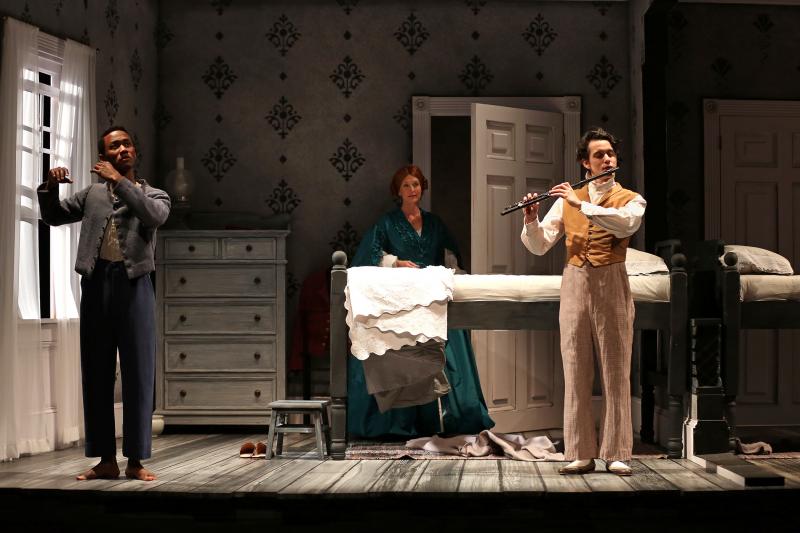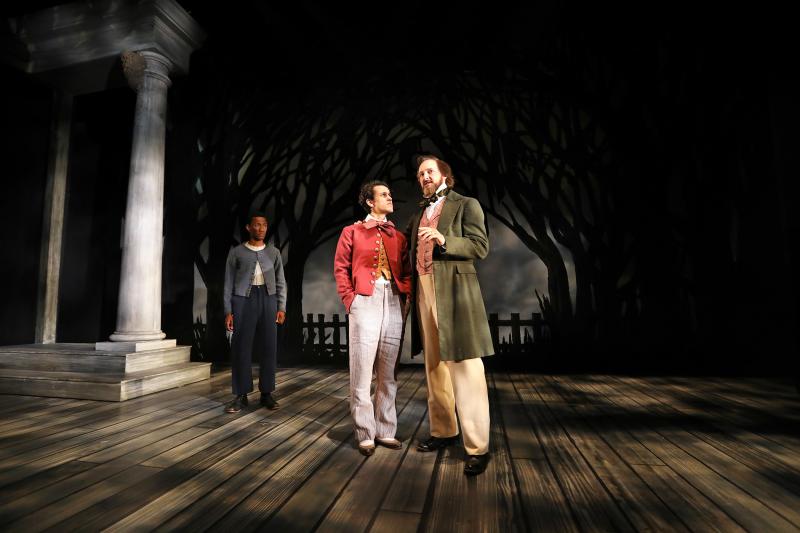Review: Haunting World Premiere Play LITTLE BLACK SHADOWS Sees the Light at South Coast Repertory
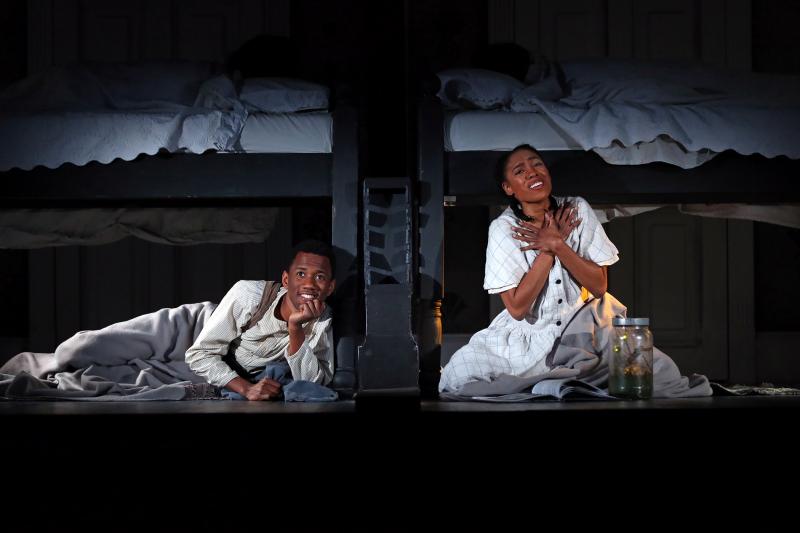
Tragically, it's not much of a surprise that our country's school textbooks are still sadly incomplete when it comes to recounting the uglier, less flattering parts of our nation's history---those shameful moments we'd rather not bring up despite both their significance in the shaping of our nation and the important lessons we can glean from them.
The abhorrent institution of slavery---and, on a wider level, the rampant racism that spews from it---is one of those uncomfortable subjects these school books merely glaze over, choosing instead to just highlight the memorable bullet points that only barely scratches the surface of the full scope of its horrors.
But then again, it is also no surprise that art---in the form of literature, the moving image, or stage plays---has often become a reliable, more enthusiastic source to fill in those knowledge gaps by shining well-deserved spotlights on stories rife with historical connections that have otherwise been ignored or silenced by continuous omission.
This becomes abundantly clear immediately upon experiencing the haunting yet beautifully-dramatized world premiere play LITTLE BLACK SHADOWS, Kemp Powers' captivating new drama under the astute direction of May Adrales, that is now continuing its final set of performances at South Coast Repertory in Costa Mesa through April 29.
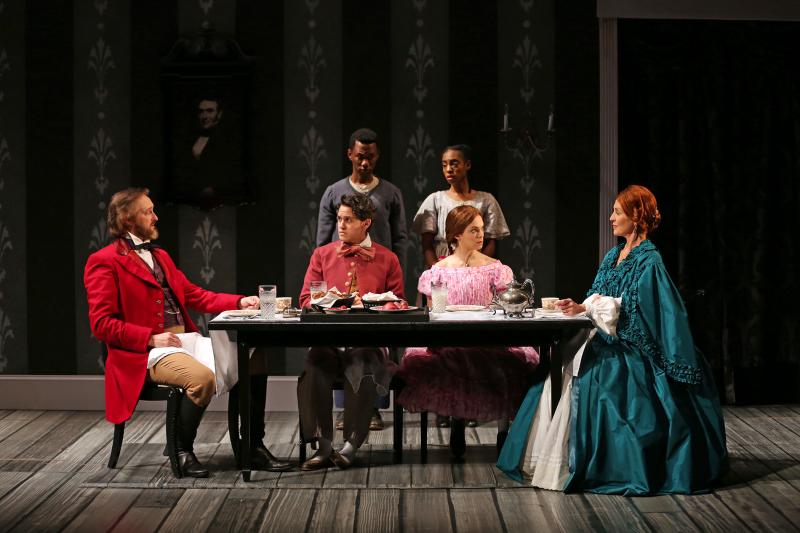
Emily Yetter, Elyse Mirto
Visually striking and richly layered, the play---which had its first public staged reading two years ago at SCR's annual Pacific Playwrights Festival---piques the audience's curiosity with its riveting storytelling while educating them on a side of American slavery that most probably didn't know too much about before---the silent, relatively "unharmed" slaves that work and live inside their master/owner's residences, sheltered many yards away from the sweat-soaked, back-breaking labors of the often much more horribly treated field slaves outside their windows.
Of course, despite seeing the "better" treatment these house slaves get from their masters in comparison, the play doesn't at all sugar-coat the notion that, yes, they are still, in fact, very much slaves---owned human beings that are treated like "purchased" pieces of property, forced from birth to serve at their master's beck and call quietly with no room for deviation, refusal, or protestation.
Yet, perhaps, the most shocking---and ultimately heartbreaking---confession from the play is to hear a character say that they felt "lucky" and "blessed" that their eternity in slavery is this particular one---one where they have a relatively safe, protective roof over their heads and one where their masters are seen as "nice," possibly because their masters don't lash them with a whip like they do the other slaves outside of these walls.
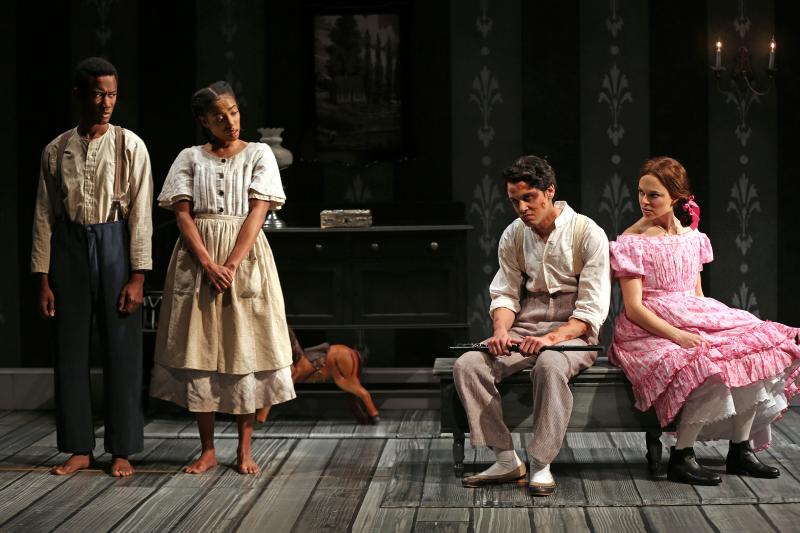
This numbness and surprising acceptance of their life in slavery is the striking point-of-view behind the play, where characters in "softened" bondage have surrendered to their lot in life, pretty much tossing away their own life's worth because, sadly, they've become accustomed to what they think is the way things are and how they should be.
In bringing LITTLE BLACK SHADOWS to life, Kemp was inspired by painstakingly pouring through multiple volumes of "Slave Narratives: A Folk History of Slavery in the United States from Interviews with Former Slaves," a collection of more than 2,300 first-person essays gathered by the Federal Government between 1935 and 1939 that recorded real life testimonials from former slaves. In these honest, eye-opening interviews, Kemp was shocked to read real-life accounts of former slaves who often spoke positively about their time spent as indentured servants---whether they were regularly abused or not.
Mixed in among the expected tales of constant torture and horrific mistreatment are accounts of former slaves waxing nostalgic about their lives enclosed in "safer" plantations and paying compliments to their former owners for their perceived "goodness," many times forgetting the fact that they, as slaves, were seen as nothing more than these people's personal property who were constantly commanded to comply to their every whim.
It's certainly a surprising point-of-view, but---as dramatized in LITTLE BLACK SHADOWS---such positive thoughts ultimately make sense in their world.
Set in an opulent home within a cotton plantation in pre-Civil War Georgia, circa 1850, the play illuminates a different, little-heard from perspective: slave children who were born into a life of servitude and know of nothing else but this kind of life.
We are introduced to Toy and Colis (superbly played by Chauntae Pink and Giovanni Adams, respectively), a pair of in-house child slaves who each spend their days within the bubble of their owner's estate, assigned specifically to cater to the needs of the home's extremely spoiled resident twin teenagers, the sharp and politically-savvy Mittie (Emily Yetter, with perfect wicked-brat cadence) and the overly sensitive, creatively-inclined Daniel (Daniel Bellusci, with perfect whiny-angsty cadence).
At the crack of dawn, as the rooster wakes up the entire plantation, Toy---who sleeps underneath Mittie's bed---and Colis---who sleeps under Daniel's bed---each wake up in advance to get their respective young masters ready for the day.
Every detail is meticulously taken care of by Toy and Colis, from the placement of a stool so each child can safely descend from their respective bunk beds after waking up, to the careful, sequential application of clothing pieces to complete each of their respective young master's day-wear ensemble. These two kids are so used to having everything done for them that even the retrieval of an item just a few inches away is a task more suited for their slaves---both of whom are not allowed to utter a single word unless directly compelled to do so.
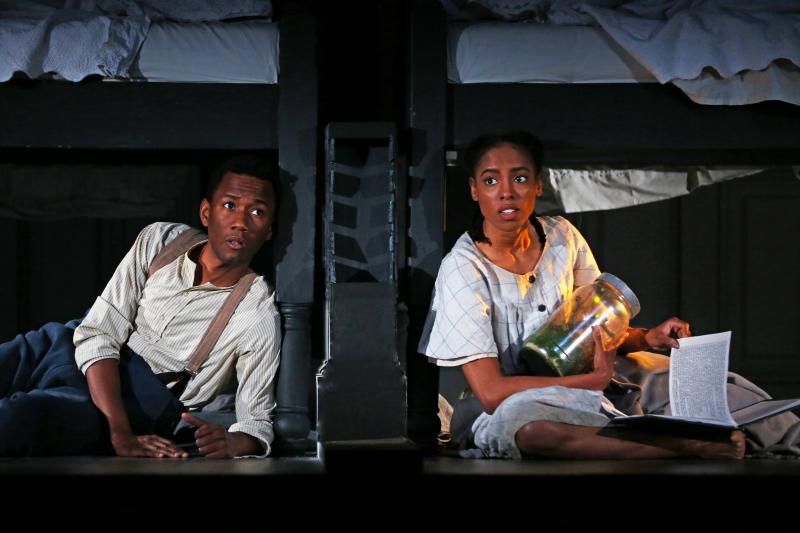
And just like house pets, Toy follows Mittie around all day while Colis does the same with his master Daniel. Each child barely lifts a finger as both Toy and Colis take care of everything for them---even minor tasks and requests assigned to them by their bougie parents (Mark Doerr and Elyse Mirto).
At the end of the long day, their morning routine is reversed as Toy and Colis prep Mittie and Colis for bed. Once their young masters have fallen sound asleep above them, Toy and Colis retreat to their own sleeping areas on the floor beneath their respective master's beds.
As the play's title suggests, Toy and Colis are the home's soundless but attentive slaves that take up very little space but are readily available to take care of tasks at a moment's notice (which is, well, always). Though Toy and Colis are not allowed to speak unless commanded to do so (if at all), they are basically always in the room for everything---allowing them unfettered access to openly observe every action and conversation within the family. Like unnoticed shadows on the floor, Toy and Colis bare witness to everything---but their silence ensures that the family gets to keep their secrets.
And once the lights are extinguished and the household is in deep slumber, Toy and Colis finally come to life. In this quiet, pitch-black darkness, these "little black shadows" are now able to be themselves, actually speak to each other, and fearlessly express their opinions---albeit in extremely hushed tones---through a shared vent in the wall that separates their sleeping quarters on the floor.
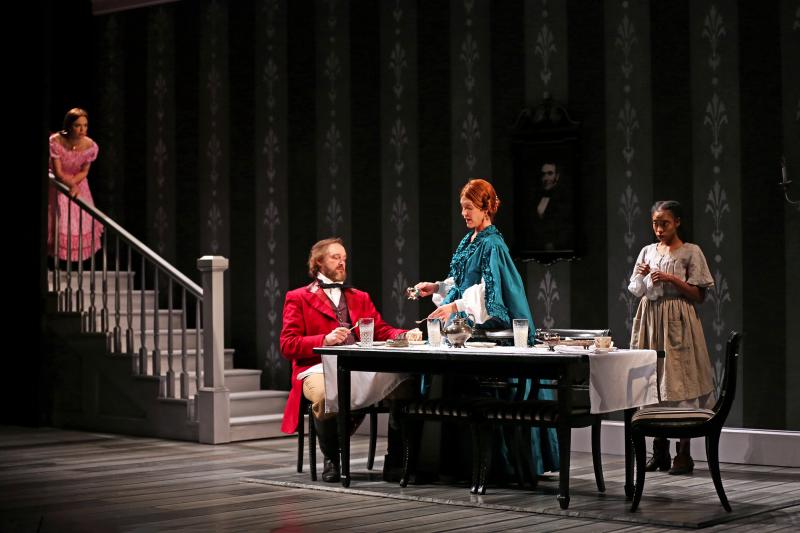
Up until now, the audience has only been afforded the ability to hear directly from the white family that owns the home. With their masters sound asleep, Toy and Colis gleefully recap their days, trading keen observations and offering their own personal takes on the goings-on of their masters.
On his side of the wall, Colis is in complete darkness, with only Toy's hope-filled voice keeping him from going mad. On her side of the wall, Toy enjoys the company of books lit only by the lights of glowing lightning bugs she has collected into a stashed jar for illumination. She can't read, so she relies on her wild, vivid imagination to fill in the blanks, so to speak.
Her storytelling skills? Pretty damn phenomenal.
Their jovial and sometimes emotional conversations---filled with child-like wonder and curiosity, giddy dreams, and endearing naiveté---soon reveal their stark detachment from their surrounding realities. Through their late night exchanges, we learn that Colis is obsessed with reuniting with his long-lost mother, now just a vague figure that recurs in his dreams. His ultimate wish is to break out of the house during the day briefly and run for the fields in hopes his mother would look up and acknowledge him.
Toy, the more grounded of the two, vehemently discourages Colis' idea, fearful that such an action would cause him (and maybe even both of them) harm.
Though Toy may seem out of touch on certain things (she believes the myth that fancy red potatoes are designed to kill black people), she is fully cognizant of the fact that she and Colis have it relatively "good" living and working at the house, in comparison to the overworked, underfed slaves out in the fields who spend their nights in their own cramped quarters on the grounds of the estate. Even more harrowing are the stories her own slave mother told her about life out in the field.
So she knows full well that their status as the "shadows" cannot be disturbed and that they should continue to be the silent servants they need to be in order to keep things "good."
"We is blessed, Colis," reiterates Toy through the vent. "We got it good... be happy with what you got!"
This feeling of misplaced contentment Toy expresses is, of course, not lost on the audience... exposing the awful truth that someone like Toy actually just accepted being trapped in slavery, unaware that she is unfairly deprived of something better than this.
Meanwhile, life for their masters isn't going as great as they assume it must be. Father is thinking of uprooting the family to Louisiana, hoping that a switch-over from cotton would be a better business alternative and that maybe their move to the more slave-friendly state would keep Northerners at a farther distance, allowing him to continue the lifestyle that he's become accustomed to. The news isn't sitting well with Mother, who wants to stay in Georgia where they are comfortable and well-respected.
For her part, Mittie is making the rounds in society trying to fulfill her one assigned job: to find an acceptable, wealthy suitor and marry well. At the moment, though, she's just happy to get her way thanks to her ability to manipulate her parents.
Daniel, on the other hand, is having a difficult time trying to be the strong man (instead of the "tender boy") that would make his Father proud of him. Daniel, you see, would rather play music on his flute at a boarding school up north than do anything else---something his Father (who thinks Daniel is a "sissy") would like to fix out of him.
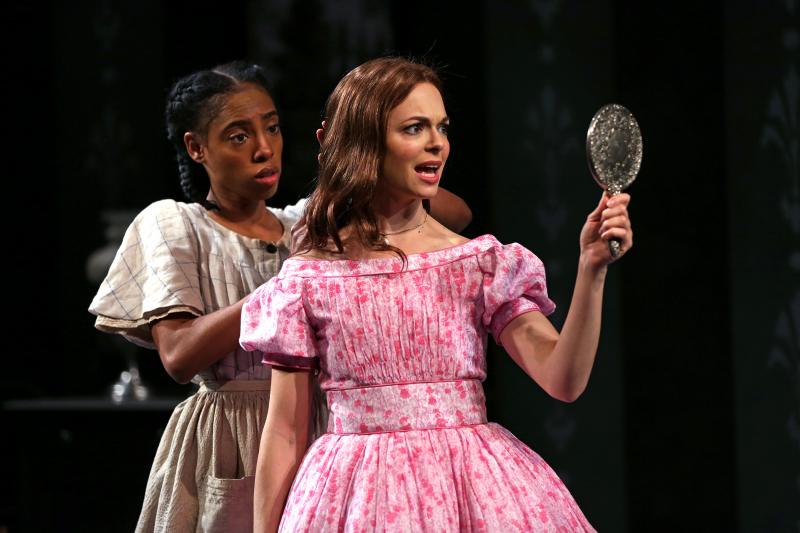
During several instances, Daniel is continuously berated by his Father to be better than he is---a clash that causes Colis to take pity on his young master. Out of blind loyalty to Daniel---and perhaps as an effort to gain his favor later---Colis contemplates breaking his silence to advise Daniel on how to gain some respect from his father and perhaps attempt at being the man his father wishes him to be, yet still retain some sense of self.
Again, Toy warns Colis not to ruin their good thing.
"We is shadows," Toy declares. "And Shadows is seen, not heard!"
A gorgeously stylized rendering of a poignant and deeply moving narrative that blends bits of welcome humor, inspiring theatricality, historical context, and vibrant, magically-tinged storytelling, LITTLE BLACK SHADOWS is an excellent first production of this fresh new play that I predict will only continually improve as it sees new future productions on the horizon.
While not the usual depiction of the violent horrors of slavery that most of us probably have been exposed to in previous narratives in film and television, this play still makes you eerily shudder despite being essentially a showcase of slavery from the "softer" viewpoint of children that have been born into the institution and have been otherwise sheltered from its harshest extremes. Slavery is not supposed to be a comfortable subject by any means, and, here, it still resonates---perhaps because these kids have sadly accepted that slavery, as long as it is in this particular form, is an okay thing to be trapped in.
As it stands, Powers has already fashioned an absorbing, important story expressed from an entirely new perspective, with fully-fleshed out characters that don't necessarily feel like archetypes we've seen before in stories that touch on these issues. And as a pure history lesson, this fact-based play is a must-see for everyone.
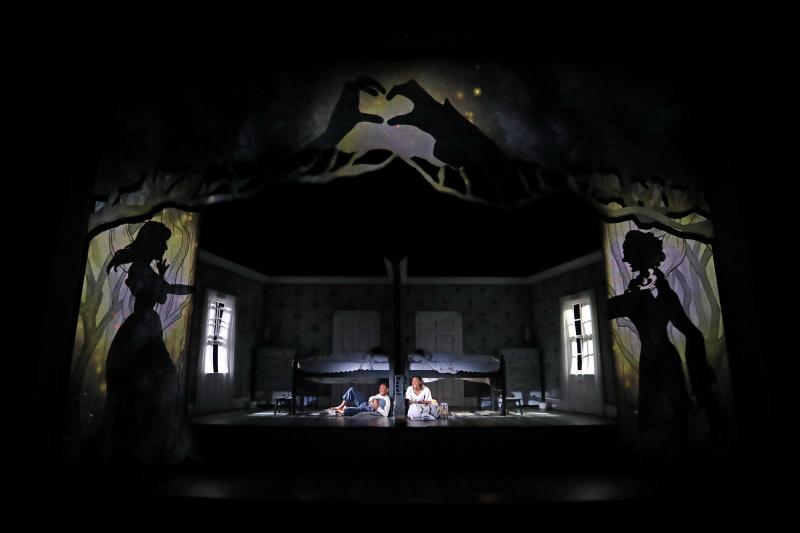
Though, admittedly, I was a little taken aback by the play's sudden climactic turn that I didn't see coming (which I won't spoil here), I ultimately appreciated that element of surprise---especially as it pertains to the underlying theme that surrounds the play: that sometimes, in the day-to-day activities of the people that lived this life, such a stark turn reminds you again that despite what looks to be a "good" life, slavery itself is still a very, very bad thing no human being should ever have to endure ever again.
Because Toy and Colis are often just silent observers during the sequences that focus on the white family they serve, it sometimes does feel like Toy and Colis have taken a back seat in the play, relegating more stage time to their oppressors. But, rather, that silence gives way to some wonderfully written exchanges between Toy and Colis later once they've open their two-way conference call through the wall vent and can talk about their observations in a "safe space."
But by far my favorite part of the entire play is Toy's vivid storytelling sequence for Colis that, on its own, had the audience utterly mesmerized. Combining PInk's remarkable, awards-worthy performance with Hana S. Kim's enthralling projection and puppet animation design, her story-within-a-story interpretation of one her found books is a masterstroke of contextual story layering and fantastical theatricality. Though she joyfully tells her story with the enthusiasm of a fan-girl recapping an exciting comic book, the underlying context of the lessons she has extracted from her own tale are just... wow, heartbreaking.
The overall style and mood of this breathtaking sequence, though, reminded me of that sequence in the film version of Harry Potter and the Deathly Hallows where an animated sequence is inserted in the film as the character of Hermione Granger narrates the story of how the Deathly Hallows came to be. In Powers' play at SCR, the proscenium comes to life with animation as Toy enthusiastically shares her imaginative (and ultimately important) parable that plays like a dark fairy folktale.
From all sides, LITTLE BLACK SHADOWS is itself "blessed" by its creative team. Aside from the visual punch provided by the projections, David M. Barber's cleverly transforming sets, Elizabeth Harper's enhancing light designs, and Sara Ryung Clement's period-faithful costumes work harmoniously to give the play its visual splendor-a great achievement in such a deceivingly small theater space. Music and sound design provided by Charles Coes and Nathan A. Roberts envelope the play in appropriate moods---from melancholy to mirth.
The entire cast is, of course, just absolutely outstanding. Yetter and Bellusci bring an unexpected complexity to their characters while Doerr and Mirto have approached their respective "ugly" characters with the kind of palpable tension that doesn't need loud embellishments. And as Toy and Colis, Pink and Adams provide powerful performances that beautifully and purposefully captured their respective characters' ultimately devastating arcs. I am astounded by their emotionally-charged performances and was touched by the genuine emotions they brought to their roles.
Audaciously moving, LITTLE BLACK SHADOWS is yet another winning world premiere production from South Coast Repertory that also reminds local theatergoers that this Tony Award-winning regional theater is consistently a welcoming home to diverse voices, allowing itself to become a go-to home for exciting new plays that highlight different cultural experiences that can be enjoyed by broad, open-minded audiences. Keep up the good work, SCR!
* Follow this reviewer on Twitter: @cre8iveMLQ *
Photos by Jordan Kubat for South Coast Repertory.
-----
The World Premiere production of Kemp Powers' LITTLE BLACK SHADOWS continues at South Coast Repertory through April 29, 2018. Tickets can be purchased online at www.scr.org, by phone at (714) 708-5555 or by visiting the box office at 655 Town Center Drive in Costa Mesa.
Reader Reviews

Videos


